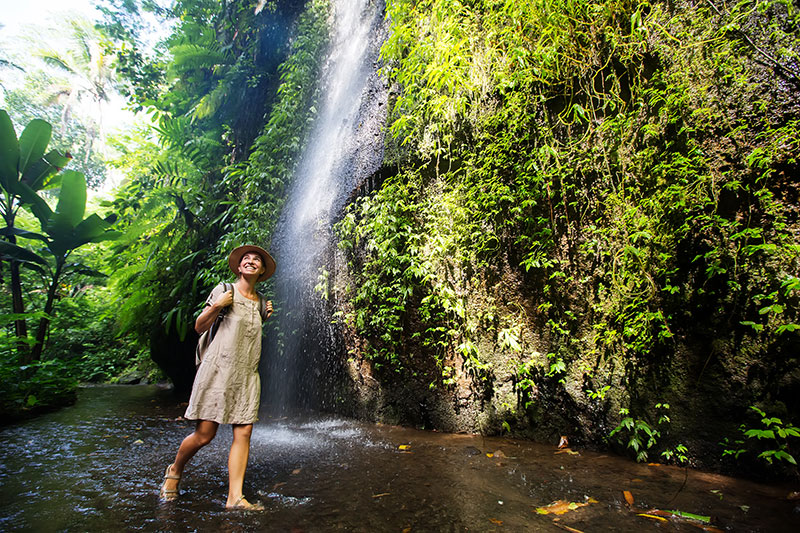Why travellers prefer Blue Cross
- Canada's #1 travel insurance brand and recognized worldwide
- Over 80 years of expertise in insurance
- $5 million travel insurance coverage, with or without deductible
- Flexible and affordable travel insurance solutions
- Free quote available online
- Travel assistance available 24/7 for any emergency, anywhere you travel

Ecotourism: Explore the World with Purpose
Published on: June 12, 2025
Is it possible to see the world without leaving a harmful mark? That’s the challenge—and promise—of ecotourism. This growing movement invites travellers to balance their curiosity for new places with care for local communities and the environment.
Why Embrace Ecotourism?
Emerging in the 1980s as a thoughtful response to mass tourism, ecotourism shifts the focus toward nature and culture, without disturbing either. It’s about discovering destinations in a way that protects their integrity, respects local traditions, and making small, meaningful choices that help preserve the planet for future generations.
With nearly 1.4 billion travellers annually1 and tourism accounting for 8.8%2 of global CO₂ emissions (UN Tourism, 2024), the need for more responsible travel has never been more urgent. Ecotourism attracts adventurers, nature lovers, and mindful travellers in search of experiences that are both authentic and impactful.
What Does Responsible Travel Look Like?
While air travel may be unavoidable, it’s also one of the most carbon-intensive parts of a trip. Fortunately, adopting a few simple, eco-conscious habits can help reduce your footprint, allowing you to fully enjoy the journey while treading more lightly on the planet.
Reducing Environmental Impact
Choose low-emission transportation like trains, bicycles, or walking—not only does it lessen environmental impact, but it also uncovers hidden gems along the way. For accommodation, consider ecolodges3 committed to sustainable practices. While an "eco" label is a good starting point, trusted certifications like Green Key, Travelife, EarthCheck, or Green Globe provide even greater assurance.
Small habits matter too. Reduce single-use plastics by bringing reusable bags, bottles, and containers to help preserve natural ecosystems.
Supporting Local Communities
Choose artisan markets, local guides, and small restaurants over mass tourism attractions. Every purchase becomes a meaningful contribution to the local economy. Learning about customs also enhances your experience while honouring local traditions authentically and respectfully.
Travelling in Harmony with Nature
Slowing down and opting for activities that honour nature, like guided wildlife viewing, eco-friendly scuba diving, or visiting an organic farm, helps you build meaningful connections with local culture. Avoid large-scale attractions that exploit animals or harm natural environments.
How to Choose an Ecotourism Destination?
Identifying an ecotourism destination doesn't require expert knowledge—just a few key criteria can help guide your choice. Look for places that protect ecosystems, limit mass tourism, promote low-impact activities, and celebrate local heritage.
To ensure sustainability, refer to certifications verifying eco-friendly accommodations and tourism sites. Trusted organizations like The International Ecotourism Society (TIES) and the Global Sustainable Tourism Council (GSTC) provide valuable resources for finding responsible travel destinations worldwide.
Top Ecotourism Destinations to Explore:
- Costa Rica: A global leader in ecotourism, with nearly one-third of its territory dedicated to national parks and nature reserves. Expect immersive experiences centered around biodiversity and environmental education.
- Slovenia: The first country certified as a “green destination” by the Green Destinations label, offering a perfect balance between sustainable tourism, nature conservation, and support for local products.
- Gaspésie, Quebec: A fantastic example of local ecotourism! This Canadian region boasts national parks, scenic bike routes, and marine conservation initiatives, letting you experience untouched wilderness without taking a flight.
- Indonesia (Flores Island): A refreshing alternative to Bali, Flores embraces slow, respectful tourism with ecolodges, breathtaking hiking trails, traditional village experiences, and marine wildlife conservation efforts.
Travel Smarter with Reliable Coverage
Mindful travel and a deep appreciation for nature go hand in hand, and having dependable insurance adds an extra layer of confidence to the experience.
With Ontario Blue Cross travel insurance, you can tailor your coverage to match your needs, whether it’s Emergency Medical Care, Trip Cancellation and Interruption, Baggage, or Accidental Death and Dismemberment.
Plus, because the unexpected can happen, you’re also covered with Flight Delay Service and 24/7 travel assistance at no extra cost—wherever your adventures take you.
Every trip is a chance to travel with greater intention.
Look for destinations where nature takes centre stage, where local communities shape authentic experiences, and where each choice is rooted in respect—that’s the heart of ecotourism.
1 UN Tourism. November 2024 "UN Tourism World Tourism Barometer | Global Tourism Statistics." Retrieved from: https://www.unwto.org/un-tourism-world-tourism-barometer-data
2 UN Tourism. November 2024 “Tourism Makes History at COP29 as 50 Countries Back Climate Action Declaration for Sector.” Retrieved from: https://www.unwto.org/news/tourism-makes-history-at-cop29-as-50-countries-back-climate-action-declaration-for-sector.
3 Ecolodge: An ecolodge is a tourist accommodation designed to minimize its environmental impact, promote the well-being of local communities and offer visitors an experience in harmony with the biodiversity of the territory. It incorporates sustainable practices such as the use of renewable energy, responsible waste management, water conservation, and supports the local economy by sourcing from regional suppliers (EcoLife).